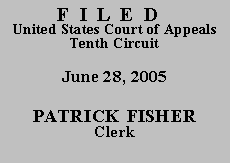

| KENNETH HARTFIELD, | No. 04-3352
(D.C. No. 03-CV-3191-JTM) (D. Kan.) |
To pursue this appeal, Hartfield must first obtain a certificate of appealability (COA). See 28 U.S.C. § 2253(c)(1)(A). To be entitled to a COA, Hartfield must make a "substantial showing of the denial of a constitutional right." Id. § 2253(c)(2). And to make this showing, he must establish that "reasonable jurists could debate whether (or for that matter, agree that) the petition should have been resolved [by the district court] in a different manner or that the issues presented were adequate to deserve encouragement to proceed further." Slack v. McDaniel, 529 U.S. 473, 483-84 (2000) (quotations omitted). After carefully considering Hartfield's arguments and the entire record, we conclude Hartfield has failed to make a sufficient showing that he is entitled to COA on any of his claims. Therefore, we DISMISS this appeal.
ENTERED FOR THE COURT
David M. Ebel
Circuit Judge
*. The district court granted Hartfield's request to proceed in form pauperis. See 28 U.S.C. § 1915(a)(1). That status continues on appeal. See Fed. R. App. P. 24(a)(3).
2. On appeal, Hartfield specifically argues that his trial attorney was ineffective for failing to 1) use Officer Naasz's police report to impeach the officer's testimony; 2) object to Nurses Schunn's and Rosenberg's testimony; 3) use police reports to rebut Detective Trollope's testimony; 4) object to the prosecutor's remarks made during closing argument; and 5) recall the victim as a rebuttal witness. In his § 2254 petition, Hartfield argued that his trial counsel was ineffective for 1) allowing Officer Naasz, Detective Trollope and Nurses Schunn and Rosenberg to give false testimony; 2) permitting trial court and prosecutorial misconduct; and 3) failing to call an eyewitness.